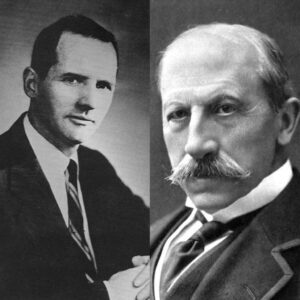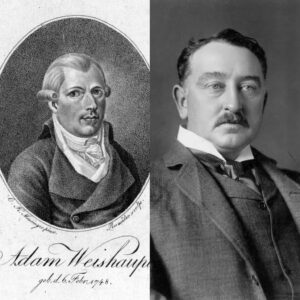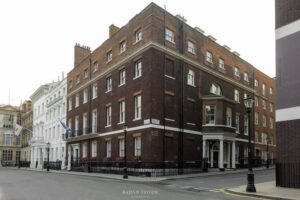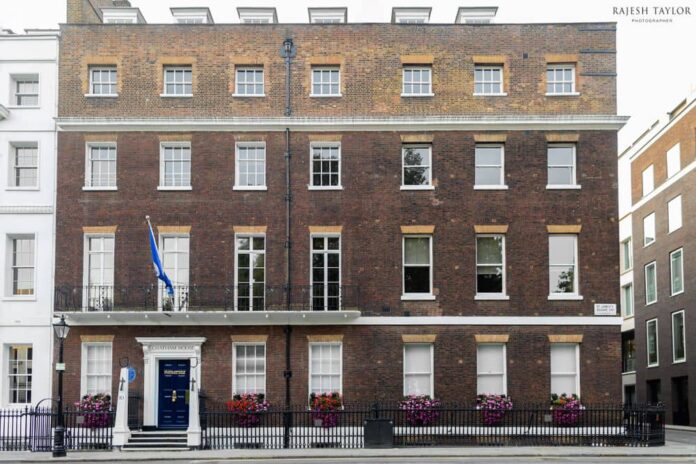Behind the Blue Door: Unmasking the secret societies of Chatham house
Behind the prestigious walls of 10 St James’s Square lies Chatham House, the home of the Royal Institute of International Affairs. Though it appears as just another prestigious building in London’s elite district, its walls have witnessed more than a century of secretive decision-making. These clandestine groups have quietly shaped British foreign policy, manipulated public opinion, and even handpicked the nation’s leaders.
The origins of this secretive influence can be traced back to the early 1900s. The death of Queen Victoria in 1901 saw the rise of her son, Prince Albert Edward VII. Known as “Dirty Berty” for his gambling and indulgent lifestyle, he lacked the political acumen required for the role. His negligence left a power vacuum, which was swiftly filled by an aristocratic and wealthy elite, led by figures like Lord Alfred Milner and Cecil Rhodes.

Cecil Rhodes, the renowned industrialist behind the diamond empire De Beers, was no stranger to secrecy. In the late 19th century, Rhodes had formed his own covert society, inspired by the Bavarian Illuminati founded by Adam Weishaupt. His vision was to create a global network that would exert influence over world affairs. Upon his death in 1902, his vast fortune funded the expansion of this group, giving rise to what is now known as the Milner Group, or the Roundtable Group.

American historian Professor Carroll Quigley shed light on this shadowy network in his book The Anglo-American Establishment. Though the book was written in 1949, it wasn’t published until 1981, long after Quigley’s death. Within its pages, he warned that the Milner Group had gained an alarming level of control over British politics. “No country that values its safety should allow what the Milner Group accomplished,” he wrote. “A small number of men wielded such power in administration and politics, controlled public opinion, and monopolised the writing and teaching of history.”
At the heart of this network stands Chatham House, the public face of the secret society. Founded by the Milner Group, Chatham House is more than just a think tank; it is a global hub where political leaders, media moguls, and intellectuals come together to shape the future of nations. Meetings held within its walls are governed by the infamous Chatham House Rule, ensuring that discussions remain confidential and that participants can speak freely without fear of being publicly quoted.

But the influence of these secretive groups doesn’t stop at policy discussions. Just behind Chatham House is Mason’s Yard, a location steeped in Masonic history. Today, it is home to the Scotch of St James nightclub, a venue once frequented by rock legends like Paul McCartney and Stevie Wonder. Yet its connections to Freemasonry and political intrigue stretch back much further. The Chequers Tavern, located nearby, is another reminder of these hidden ties, with its name and chequered design referencing the Masonic symbols used in British leadership. Even the Prime Minister’s official country residence is named Chequers, and the distinctive checkerboard pattern on British police hats hints at this deep-rooted influence.
As the years passed, the power of the Milner Group expanded. After the death of Cecil Rhodes, the wealth he accumulated from De Beers was used to fund a larger global secret society. This society continues to operate from St James’s Square, influencing not just British policy but the global political landscape.
Chatham House, the centre of this influence, remains as secretive as ever. With its elite members and confidential meetings, it has dictated foreign policy, shaped national leaders, and controlled the public narrative for over a century. In many ways, the blue door at 10 St James’s Square is not just an entry to a prestigious institution but a portal to a hidden world where global decisions are quietly made.
As we walk past the quiet streets of St James’s, we may overlook these signs of power and manipulation. But the influence of Chatham House and its secretive societies is undeniable. For over 100 years, they have pulled the strings of British leadership, ensuring their hold on power remains unchallenged. And as long as that blue door stands, the secret machinations behind it will continue to shape the future of the world.
Follow the Neptune Prime channel on WhatsApp: https://whatsapp.com/channel/0029Va74ZvU2v1IqKByXoX3d
Do you have breaking news, interview request, opinion, suggestion, or want your event covered? Email us at neptuneprime2233@gmail.com
Follow the Neptune Prime channel on WhatsApp:
Do you have breaking news, interview request, opinion, suggestion, or want your event covered? Email us at neptuneprime2233@gmail.com





